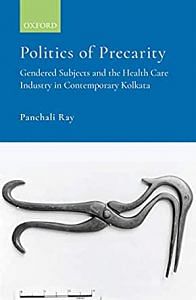The urgency to label nursing labour as ‘care labour’ could also arise from nursing ethics, which has a history of accommodating care ethics in its methodology. Nursing overlaps strongly with domestic work. The distinctions between affective labour that calls for ‘taking care’, ‘responding to needs’ of the recipient of care and menial/manual labour oriented towards cleaning rather than caring is at best fuzzy.
The domestic worker, nurse, or governess fulfils a role that is crucial in reproducing life in its most crude and biological form. What exactly comes under nursing care, and what under other domestic services? The difficulty in disentangling nursing from other kinds of domestic labour often leads to a conflation between the two, thus extending the stigma associated with the former to the latter. In fact, the struggles of the nursing profession have been to disassociate itself from domestic work and establish itself as skilled, trained labour, often leading to compartmentalization. While nursing within the domestic sphere overlaps with other kinds of reproductive labour, it is assumed that the professionalization of nursing would have countered such trends.
Nursing labour is essential for reproduction of life—cleaning the sick body, tending to bed sores, feeding, aiding in daily ablution, fanning and sponging, uttering soothing words to calm patients enough to administer medicine or take temperature, keeping the environment clean, making the bed, disinfecting and sterilizing instruments, watching over patients for symptoms that help in diagnosis—a range of activities that include menial, manual, and affective labour which requires varied skills. For example, changing soiled sheets without making the sick person get up from bed requires not just skill but also strength and dexterity. It goes without saying that diagnosis and administering medicine is one component of healing; regular care, cleaning, and vigilance over the sick body and the environment forms the backbone of the healing process. Not just reproduction of life, nursing, like domestic work in middle-class households, is also status-producing work; it is bound with reproduction of lifestyles.
Also Read: How mathematics can be an anti-racist, feminist enterprise
Nurses have the responsibility of ensuring that both the sick person and his/her environment are not dirty, infected, and contaminating. They are the keepers of the boundaries between sickness and health, ill-being and well-being, contamination and purity. Thus a nurse is not just responsible for ensuring that there are no open festering wounds, infected equipment, dirty and soiled bandages/clothes, but also for maintaining a clean, sanitized, and cheerful sick room essential for reproducing social order. The classification of nursing labour thus poses a problem given the multiple tasks that fall under its ambit, which range from purportedly unskilled domestic work to highly specialized medical tasks.
The increasing commodification of women’s reproductive labour raises newer questions on ethics. The tension between acknowledging the relational and the emotional component of feminine affective labour and the difficulty in measuring and adapting it to market values informs most of the debates on paid care work. The demand for valorizing reproductive labour as skilled work so as to be able to ascribe a market value to emotional/affective labour is in direct tension with understanding ‘care’ as a distinct feminine quality that escapes masculine market transactions.
It would be fruitful to look at the intersection of feminist debates on care ethics with newer concerns of renaming paid reproductive labour as care work, particularly in the context of nursing. Carol Gilligan’s In a Different Voice (1982) sparked the debate on care ethics, where she argued that feminine morality and conception of the self as relational, interdependent, and located in a complex web of social relations gave rise to an ‘ethics of care’ as against the masculine ‘ethics of morality’. This context-bound character of care ethics informed much of later theorization on work ethics, particularly for health service providers; nursing ethics, for instance, is far more hospitable to care ethics than others.
Feminists have critiqued the traditional Western health care system that presumes that doctors are the sole repositories of specialized knowledge, and patients are constructed as passive recipients and beneficiaries. The questioning of such traditional views of knowledge has highlighted the role of patients and other health care providers as equal participants in knowledge production. This challenge to traditional ways of knowing has opened up debates on nursing ethics that perceive nurses as equal participants in the healing process but distinguishes them from that of a physician.
Also Read: Women aren’t better multitaskers than men – they just do more work
Nursing ethics highlights the ‘caring’ role of nurses as relational and context-specific interventions that stress on affective bonds as against medical approaches. However, traditional nursing ethics are hardly feminist; deploying gender-oppressive norms and stereotypes, it promotes nursing as secondary to other forms of medical interventions. The association of women’s work with care implied that historically doctors distanced themselves from such roles, carving out a professional function that had no linkages with affective/emotional labour. In later periods, when nursing education was modified to incorporate scientific and medical components, it occasioned debates regarding the suitable role of a nurse. This sexual division of labour within health care services reflects wider hierarchical binaries of objective/subjective, reason/emotion, masculine/feminine whereby male doctors practiced medicine and female nurses healed through affective labour, both inhabiting normative gender roles.
In the Nightingale model, every nurse was to give bedside care; now the staff nurses leave it to nursing auxiliaries and concentrate on cleaner and more prestigious administrative tasks. Florence Nightingale’s initiation of reforms included training, which was divided into theoretical and on duty/ward training. This learning or knowledge dissemination is usually seen as the inception of the power struggle between doctors and nurses. Such medical training was meant to ensure an informed, ancillary labour force that doctors could rely on, which in turn would allow him/her to function as a skilled consultant. The medical component in nursing training, however, became the ground for new claims on scientific knowledge by nurses, which challenged the doctor’s stated monopoly in diagnosis and treatment.
Nurses also demonstrated a preference for technical work rather than affective work, which made the division of labour and hierarchy in the medical profession and within nursing self-evident. In America for instance, from the mid-twentieth century, the medical workforce was no longer divided into doctors and nurses (corresponding to gendered cure/care binaries), but a new rank of workers emerged, and were increasingly formalized as aides, ancillary workers, and orderlies who gave hands-on nursing care. Registered nurses were careful to draw boundaries that distinguished them from unregistered semi-trained nursing ancillaries. Both categories remain overwhelmingly feminine, however, over the years, the latter was predominantly composed of black and immigrant women.

This excerpt from Politics of Precarity by Panchali Ray has been published with permission from Oxford University Press.



